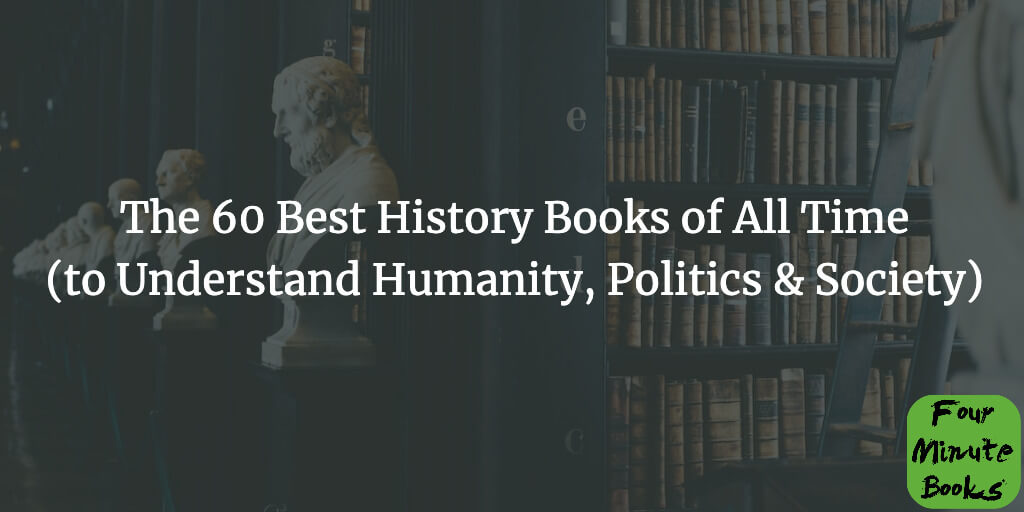
“Those who cannot remember the past are condemned to repeat it,” George Santayana wrote in 1905. As humans, we can only remember our own past, but we’ve also invented a mind-blowing technology: books. Because others wrote down their past right after it happened, we can “remember” a lot more than just what we’ve experienced ourselves. That’s why history books are some of the most interesting, important, and valuable reads of all — and if you’re here for an overview of the best ones, I say come in, take a seat, and get comfortable!
A good history book will transport you to a time and place in which you’ll never live and introduce you to people you’ll never get to meet. Best of all, it’ll drop you off back home safely and in time for dinner! Whether you’re curious, care about society and our planet, or want to be successful, you could do worse than to start with the history section in the library. Ray Dalio, CEO of the world’s largest hedge fund, credits studying history for his great understanding of macroeconomics — reading history books literally made him a billionaire!
So, if you’re ready to explore how humans came to be the dominating species, what pros and cons different political systems have, or which technological innovations have had the biggest impact on humanity, we’ve got just the curriculum for you. After summarizing over 1,000 books, we’ve hand-selected the absolute best titles in the history category for you.
In order to make this list easy to navigate, we’ve sorted the best history books into several groups:
- Best History Books Overall
- America and the United States
- India, China, and the East
- Europe
- Food
- Technology
- Space, Time, and the Universe
- The Evolution of Humans
- Economics
- Global Politics
- Civilization and Society
- Nation States and Political Systems
- Ethics
- The Evolution of Philosophy
- Climate Change & Population Growth
- Best History Books With a Self-Help Angle
- Important People
For each book, we’ve included our favorite quote, a one-sentence-summary of the book, why you might want to read it, and three key takeaways. We’ve also added links to read the free summary of the book on Four Minute Books or buy a copy for yourself on Amazon. Just use the buttons below each title. Lastly, use the clickable table of contents below to quickly jump to any book or category. There should also be an arrow in the bottom right corner that you can use to come back up here at any time!
Alright, the class is in session! Let’s dive deep into the world’s best history books!
Table of Contents
- Best History Books Overall
- Best History Books About America and the United States
- Best History Books About India, China, and the East
- Best History Books About Europe
- Best History Books About Food
- Best History Books About Technology
- Best History Books About Space, Time, and the Universe
- Best History Books About the Evolution of Humans
- Best History Books About Economics
- Best History Books About Global Politics
- Best History Books About Civilization and Society
- Best History Books About Nation States and Political Systems
- Best History Books About Ethics
- Best History Books About the Evolution of Philosophy
- Best History Books About Climate Change & Population Growth
- Best History Books With a Self-Help Angle
- Best History Books About Important People
- 54. Alexander the Great by Philip Freeman
- 55. Benjamin Franklin: An American Life by Walter Isaacson
- 56. The Autobiography of Malcolm X by Malcolm X
- 57. Steve Jobs by Walter Isaacson
- 58. The Immortal Life of Henrietta Lacks by Rebecca Skloot
- 59. A Woman of No Importance by Sonia Purnell
- 60. Long Walk to Freedom by Nelson Mandela
- Conclusion
- Other Book Lists by Topic
- Other Book Lists by Author
Best History Books Overall
1. Sapiens by Yuval Noah Harari
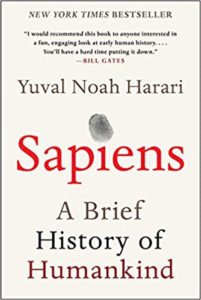
Favorite Quote
“History is something that very few people have been doing while everyone else was ploughing fields and carrying water buckets.” — Yuval Noah Harari
The Book in One Sentence
Sapiens is your guide to becoming an expert on the entire history of the human race as it reviews everything our species has been through from ancient ancestors to our dominating place in the world today.
Why should you read it?
This might be the most comprehensive, all-in-one history book out there. It is jam-packed with fascinating facts and details, making it an essential read for anyone interested in human history.
Key Takeaways
- The ability to think gave early humans language, which eventually led to agricultural advances allowing them to grow exponentially.
- Improvements in trade were only possible with the invention of money and writing.
- With better economic and communication means, scientific progress gave our race the abilities necessary to get to where we are today.
If you want to learn more, you can read our free four-minute summary or get a copy for yourself.
_____
2. The Lessons of History by Will & Ariel Durant
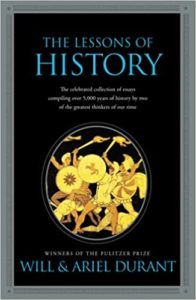
Favorite Quote
“You can’t fool all the people all the time, but you can fool enough of them to rule a large country.” — Will & Ariel Durant
The Book in One Sentence
The Lessons of History describes recurring themes and trends throughout 5,000 years of human history, viewed through the lenses of 12 different fields, aimed at explaining the present, the future, human nature, and the inner workings of states.
Why should you read it?
If you want a concise overview of the causes behind major events throughout history, read this book. It will change the way you view society, politics, culture, and even personal relationships. You’ll learn how to see the world through a different lens and finally understand why things happen as they do.
Key Takeaways
- Humans are unequal by nature, fighting that would mean giving up freedom.
- The evolution of humans was a social one, not a biological one.
- War is a more natural state than peace.
If you want to learn more, you can read our free four-minute summary or get a copy for yourself.
_____
3. The Dawn of Everything by David Graeber & David Wengrow
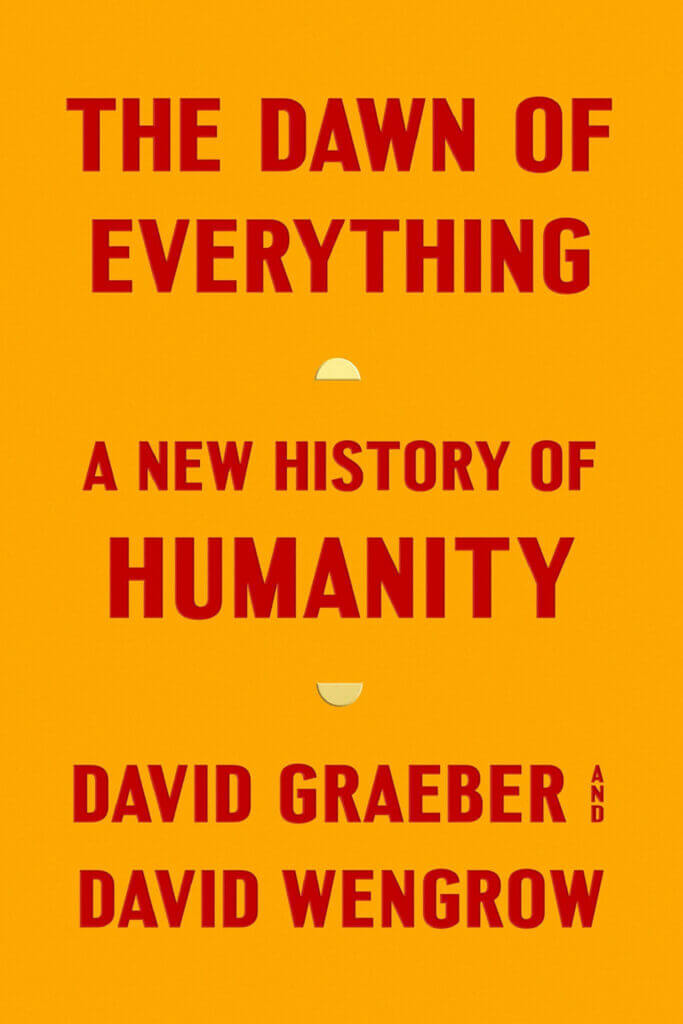
Favorite Quote
“We are projects of collective self-creation. What if we approached human history that way? What if we treat people, from the beginning, as imaginative, intelligent, playful creatures who deserve to be understood as such?” — David Graeber & David Wengrow
The Book in One Sentence
The Dawn of Everything uses archaeological evidence to argue the case that human history did not follow a linear path but emerged from a big, complex network of individual, decentralized communities.
Why should you read it?
This book puts history on its head, arguing against much of what is taken for granted in schools and universities across the globe. The last book written before Graeber’s sudden death in 2020, it will challenge your very understanding of history, thus making it a top read in the category.
Key Takeaways
- There is no single original form of human society; many different versions have developed independently over millennia.
- There are three ways to dominate in human societies: sovereignty, bureaucracy, and politics.
- Instead of complaining about inequality, we should ask ourselves how we lost the flexibility and political creativity we once used to have.
If you want to learn more, you can read our free four-minute summary or get a copy for yourself.
_____
4. The Evolution of Everything by Matt Ridley
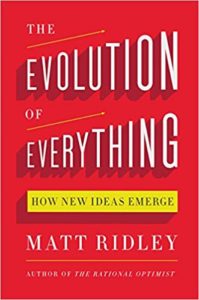
Favorite Quote
“The things that go well are largely unintended; the things that go badly are largely intended.” — Matt Ridley
The Book in One Sentence
The Evolution of Everything compares creationist to evolutionist thinking, showing how the process of evolution we know from biology underlies and permeates the entire world, including society, morality, religion, culture, economics, money, innovation, and even the internet.
Why should you read it?
This could almost qualify as a self-help book. The distinction between creationist and evolutionist thinking, and learning how to spot them both everywhere, will change your life and allow you to make progress in almost any situation.
Key Takeaways
- Evolutionist and creationist thinking are two opposing views, and creationist thinking dominates the Western world.
- Culture, economics, and technology all progress through evolution.
- Money changed from evolutionist to creationist subject, and the same might happen with the internet.
If you want to learn more, you can read our free four-minute summary or get a copy for yourself.
_____
5. Factfulness by Hans Rosling
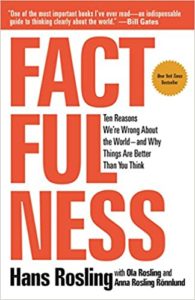
Favorite Quote
“There’s no room for facts when our minds are occupied by fear.” — Hans Rosling
The Book in One Sentence
Factfulness explains how our worldview has been distorted with the rise of new media, which ten human instincts cause erroneous thinking, and how we can learn to separate fact from fiction when forming our opinions.
Why should you read it?
This book will help you fight your many biases. Through easy-to-understand research and engaging examples, you’ll learn to see the truth rather than just the media’s spin on things. If Bill Gates can learn something from this book, I think so can you and I.
Key Takeaways
- There is no such thing as “the East and the West.” We only have one world.
- Population growth will eventually level off, despite our perception of increasing numbers.
- To see the world accurately, you always need multiple perspectives.
If you want to learn more, you can read our free four-minute summary or get a copy for yourself.
_____
6. Enlightenment Now by Steven Pinker
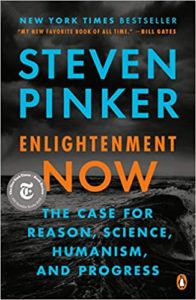
Favorite Quote
“There can be no question of which was the greatest era for culture; the answer has to be today, until it is superseded by tomorrow.” — Steven Pinker
The Book in One Sentence
Enlightenment Now describes how the values of the Enlightenment — science, reason, humanism, and progress — keep improving our world today, making it a better place day by day, despite the negative news.
Why should you read it?
This book is a welcome antidote against fake news, media manipulation, and populism. If you need to regain your faith in humanity or want some hope, this title will show you that not everything is as bad as it seems to be in the news.
Key Takeaways
- Wealth has increased not just in the West but around the globe, all while decreasing poverty and inequality.
- The United Nations bring humanism to a global scale, which has made our lives safer than ever.
- We still have problems, such as AI, terrorism, and the environment, but we must face them with reason.
If you want to learn more, you can read our free four-minute summary or get a copy for yourself.
_____
Best History Books About America and the United States
7. A People’s History of the United States by Howard Zinn
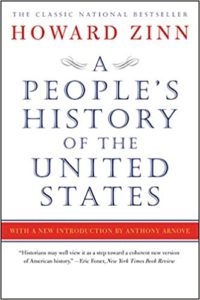
Favorite Quote
“The memory of oppressed people is one thing that cannot be taken away, and for such people, with such memories, revolt is always an inch below the surface.” — Howard Zinn
The Book in One Sentence
A People’s History of the United States will give you a better understanding of the true, sometimes shameful, sometimes inspiring, story of America’s rise to power.
Why should you read it?
Historically, the US has been terrible at being honest about how it got to where it is. Then again, so are most countries. History is written by the winners, as they say. That’s why it’s so important to get the other side of the story, and that’s what this book delivers. Just be careful not to let your anger keep you from focusing on a better future rather than the not-so-nice past.
Key Takeaways
- The founding fathers set up the US government to benefit wealthy landowners, who still have power today.
- The Civil War wasn’t as much about ending slavery as it was about advancing political interests.
- The US has repeatedly used war as a way to improve their economic situation.
If you want to learn more, you can read our free four-minute summary or get a copy for yourself.
_____
8. Common Sense by Thomas Paine
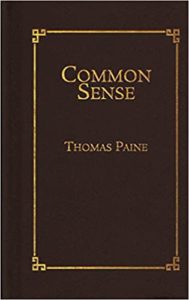
Favorite Quote
“Time makes more converts than reason.” — Thomas Paine
The Book in One Sentence
Common Sense is a classic piece of US history that will show you the importance of societies coming together to form a fair governmental system, and how these ideas paved the way for the American revolution.
Why should you read it?
This book helped kickstart the American Revolution. If you want to know what it takes to write a compelling manifesto, this book is a great place to start. It’ll also show you how to collaborate well and lead great teams by getting people to rally around a shared cause.
Key Takeaways
- We depend on each other to survive and thrive, and this means that we need society and rules to guide us.
- Having kings and queens is a bad idea, it’s better to elect representatives to enact laws that the people want.
- Just like a teenager preparing to leave home, America came to a point where it had to separate from its mother country.
If you want to learn more, you can read our free four-minute summary or get a copy for yourself.
_____
9. Team of Rivals by Doris Kearns Goodwin
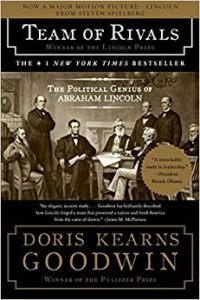
Favorite Quote
“A real democracy would be a meritocracy where those born in the lower ranks could rise as far as their natural talents and discipline might take them.” — Doris Kearns Goodwin
The Book in One Sentence
Team of Rivals explains why Abraham Lincoln rose above his political rivals despite their stronger reputations, and how he used empathy to unite not just his enemies but an entire country.
Why should you read it?
If you want to know more about how Abraham Lincoln managed to do what he did — see through the abolition of slavery — this book is a must. It’s also a good primer on how to work with your enemies rather than against them, something that’s especially needed in today’s times of division and extremism. Bill Gates thinks it’s the best book about leading a country there is.
Key Takeaways
- Lincoln’s many hardships as a child shaped his ambitions and strengthened his resolve to succeed as an adult.
- Due to his brief track record in politics, Lincoln was the most unlikely choice as a presidential candidate.
- After Lincoln’s assassination, both the North and South felt the country had suffered a tragic loss, since his leadership was extraordinary.
If you want to learn more, you can read our free four-minute summary or get a copy for yourself.
_____
10. The Warmth of Other Suns by Isabel Wilkerson
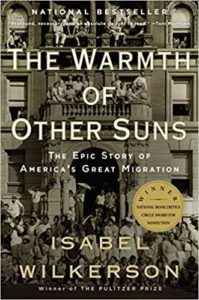
Favorite Quote
“They did what human beings looking for freedom, throughout history, have often done. They left.” — Isabel Wilkerson
The Book in One Sentence
The Warmth of Other Suns is the story of how and why millions of Black Americans left the South between 1915 and 1970 to escape the brutality of the Jim Crow Laws and find safety, better pay, and more freedom thanks to what is known today as The Great Migration.
Why should you read it?
Through multiple stories from several perspectives, this book will teach you empathy and a better understanding of the history of Black people in America.
Key Takeaways
- The Great Migration happened for many different reasons, and people left from and went to diverse places throughout it.
- Ida Mae and her family were just one example of a Black family leaving the South to become safer and earn more money.
- Settling in Chicago, Ida Mae entered the workforce, but like many others, she didn’t see all of the benefits she had hoped moving would bring.
If you want to learn more, you can read our free four-minute summary or get a copy for yourself.
_____
Best History Books About India, China, and the East
11. Orientalism by Edward W. Said
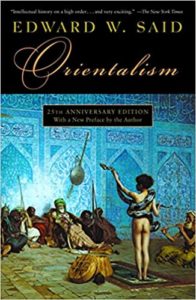
Favorite Quote
“Our role is to widen the field of discussion, not to set limits in accord with the prevailing authority.” — Edward W. Said
The Book in One Sentence
Orientalism reveals why false Western assumptions about Eastern countries have prevailed for over 200 years, and how they still affect how we view the Eastern world today.
Why should you read it?
Asian cultures in Western countries are some of the most discriminated against minorities today, and if you care about racism, or rather, want to take a stand against it, this book will show you how to do that when it comes to the Eastern nations of the world.
Key Takeaways
- Western people fabricated views of Eastern nations, telling stories in ways that would benefit Western nations.
- The inroads of Orientalism made it difficult for even those with a genuine interest in the East to see it truthfully.
- Although the name has faded, three key characteristics still govern modern Orientalism today.
If you want to learn more, you can read our free four-minute summary or get a copy for yourself.
_____
12. Restart by Mihir S. Sharma
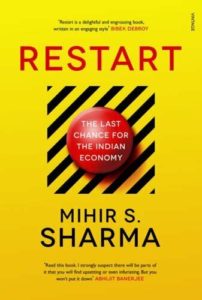
Favorite Quote
“Better people are possible to create, even in Delhi.” — Mihir S. Sharma
The Book in One Sentence
Restart tells the story of India’s almost-leadership of the world’s economy, showing why and how it instead succumbed to problems from the past, how those problems still hold it back today, and what the country might do about them.
Why should you read it?
If you know little about India or want to learn more about your country’s history, this book is for you. It’s also a good read if you are or want to go into politics or economics.
Key Takeaways
- India struggles in part because of its inadequate infrastructure, which results from cultural beliefs affecting manufacturing practices.
- Unemployment is a big problem in India because there aren’t enough industrial jobs available, and farms are unprofitable.
- The government puts too much power in the private sector, but if they didn’t, things could improve.
If you want to learn more, you can read our free four-minute summary or get a copy for yourself.
_____
13. Age of Ambition by Evan Osnos
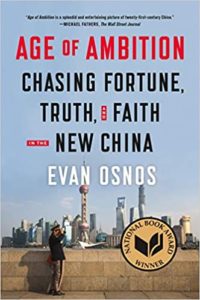
Favorite Quote
“Hope is like a path in the countryside: originally there was no path, but once people begin to pass, a way appears.” — Evan Osnos
The Book in One Sentence
Age of Ambition explains how China has gone from impoverished, developing country to a world superpower and economic powerhouse in just 30 years.
Why should you read it?
This book will get you up to speed on China, but it’ll also show you that normal people still have the power to make a big difference in and for their nation. If you’re fascinated with China’s rise to power, this is the book for you.
Key Takeaways
- Politics didn’t cause China’s rise to power, it was the average, everyday peasant class.
- The Chinese people are ambitious for success.
- Freedom of choice in China hasn’t always been strong, but the country’s increasing individuality is making it easier.
If you want to learn more, you can read our free four-minute summary or get a copy for yourself.
_____
Best History Books About Europe
14. Napoleon the Great by Andrew Roberts
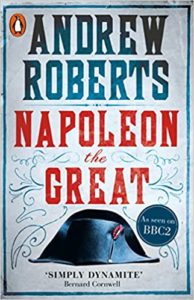
Favorite Quote
“Never interrupt your enemy when he is making a mistake.” — Napoleon Bonaparte
The Book in One Sentence
Napoleon the Great is the definitive, modern biography of legendary leader, French idol, and European visionary Napoleon Bonaparte, detailing his life from his early years as an immigrant to his rise through the military ranks, all the way to his greatest battles, political achievements, and ultimate exile.
Why should you read it?
If you ever wanted to learn more about Napoleon Bonaparte and his life, look no further than this very detailed book. It is an easy read yet full of information, much better than reading his Wikipedia page. Plus, the book will show you that if you’re ambitious enough, you can achieve great things in life.
Key Takeaways
- Napoleon was (almost) an immigrant, which turned out to be a huge advantage.
- He had a truly Stoic philosophy about life.
- Like all great leaders, Napoleon was ahead of his time.
If you want to learn more, you can read our free four-minute summary or get a copy for yourself.
_____
15. The House of Rothschild by Niall Ferguson
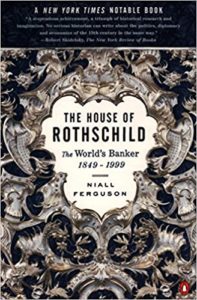
Favorite Quote
“The most outstanding personal qualities may sometimes require exceptional circumstances and world-shattering events to come to fruition.” — Niall Ferguson
The Book in One Sentence
The House of Rothschild examines the facts and myths around the wealthiest family in the world in the 19th century, and how they managed to go from being outcast and isolated to building the biggest bank in the world.
Why should you read it?
One of the aspects of being good at making and handling money is knowing its history, but this book is for more than just investors. If you’re curious about the history of banking or want to break into an industry that’s hard to crack, this book is a must-read.
Key Takeaways
- In business, use whatever industry is available to you as a springboard into the next one.
- If the best solution isn’t good enough, build your own.
- Expect the 80/20 rule to apply, even in the most extreme cases.
If you want to learn more, you can read our free four-minute summary or get a copy for yourself.
_____
Best History Books About Food
16. A History of the World in 6 Glasses by Tom Standage
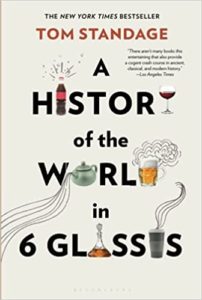
Favorite Quote
“Quickly, bring me a beaker of wine, so that I may wet my mind and say something clever.” — Tom Standage
The Book in One Sentence
A History of the World in 6 Glasses will teach you the origins and impact of the world’s six favorite drinks: beer, wine, spirits, tea, coffee, and soda.
Why should you read it?
If you enjoy a good drink or “Feierabendbier,” as we call our post-work beer here in Germany, this book is for you. It’ll teach you more about the origins of your favorite beverage, as well as reveal how different drinks have become dominating forces in various cultures. Fascinating!
Key Takeaways
- Beer is much older than you might think and had a major part in the move of our ancestors to farming instead of hunting and gathering.
- The Middle Ages brought the existence of coffee, which was originally most useful for intellectuals like scientists.
- Coca-Cola’s original purpose was medicinal, but Americans began drinking it for pleasure and it quickly spread worldwide.
If you want to learn more, you can read our free four-minute summary or get a copy for yourself.
_____
17. Salt: A World History by Mark Kurlansky
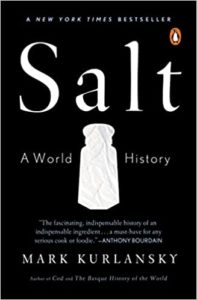
Favorite Quote
“The Roman army required salt for its soldiers and for its horses and livestock. At times soldiers were even paid in salt, which was the origin of the word salary and the expression ‘worth his salt’ or ‘earning his salt.’” ― Mark Kurlansky
The Book in One Sentence
Salt: A World History explores how the everyday mineral we know as table salt has shaped human civilization for centuries, causing wars and even the rise and fall of entire empires.
Why should you read it?
If you’re the kind of person who tends to miss the obvious that’s right in front of them, this book is for you. It is a “well-seasoned,” riveting narrative about what seems to be a boring everyday product, showing how it lies at the heart of some of history’s biggest conflicts. Includes lots of illustrations too!
Key Takeaways
- One of the wealthiest, ancient, unknown people is the Celts, who built their empire on salt.
- The demand for salt fueled and escalated the conflict between young America and Great Britain into a full-blown revolutionary war.
- The salt industry has caused much environmental damage, but the tax levied on it has concentrated power in the hands of a few big players.
If you want to learn more, you can read our free four-minute summary or get a copy for yourself.
_____
Best History Books About Technology
18. Homo Deus by Yuval Noah Harari
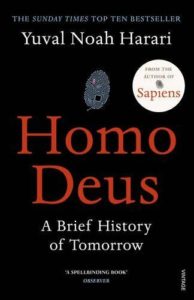
Favorite Quote
“This is the best reason to learn history: not in order to predict the future, but to free yourself of the past and imagine alternative destinies.” — Yuval Noah Hariri
The Book in One Sentence
Homo Deus illustrates the history of the human race from how we came to be the dominant species to what narratives are shaping our lives today, all the way to which obstacles we must overcome next to continue to thrive.
Why should you read it?
Sapiens is Harari’s take on the past — Homo Deus offers a glimpse into the future. If you care about where the world is headed and want to know which paths might spell our utopia or doom, this is a great read!
Key Takeaways
- Shared narratives are what allow us to collaborate at a large scale and, thus, dominate as a species.
- The most prevalent, current narrative is humanism.
- Algorithms could eventually replace us, depending on which future narrative takes over.
If you want to learn more, you can read our free four-minute summary or get a copy for yourself.
_____
19. How We Got to Now by Steven Johnson
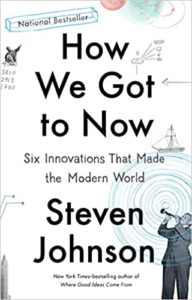
Favorite Quote
“Sometimes the way a new technology breaks is almost as interesting as the way it works.” — Steven Johnson
The Book in One Sentence
How We Got to Now explores the history of innovation, how different inventions connect to one another, and what we can do to create an environment in which change and innovation blossom.
Why should you read it?
Innovation is a complex process, but this book makes it terrific fun to learn more about it. If you want a brief overview of history’s most important inventions or feel like you can’t change the world on your own, this book is a must-read.
Key Takeaways
- Innovations can create an environment for more change, rather than just a change on their own.
- One innovation can act as a springboard for another, unexpected one, and even change the legal situation.
- Some innovations highly depend on the person creating them and their rich background.
If you want to learn more, you can read our free four-minute summary or get a copy for yourself.
_____
20. The Third Wave by Steve Case
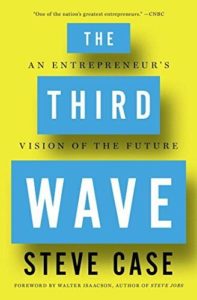
Favorite Quote
“We’ll realize that what’s emerging is the much broader Internet of Everything.” — Steve Case
The Book in One Sentence
The Third Wave lays out the history of the internet, including why it’s about to permeate everything in our lives, as well as what it takes for entrepreneurs to make use of this mega-trend and thrive in an omni-connected, always-online world.
Why should you read it?
If you feel like you need to get up to speed with the internet (no judgements here), this book is for you. It’ll also show you the potential the internet (still) has, so if you want to build an online business, this is also a great read!
Key Takeaways
- The internet will soon permeate everything on this planet.
- You must embrace disruption to thrive in a Third Wave world.
- Cooperate with Second Wave incumbents to succeed.
If you want to learn more, you can read our free four-minute summary or get a copy for yourself.
_____
21. At Home by Bill Bryson
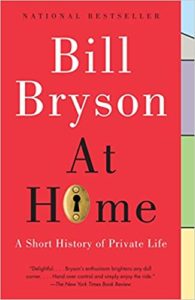
Favorite Quote
“It is always quietly thrilling to find yourself looking at a world you know well but have never seen from such an angle before.” — Bill Bryson
The Book in One Sentence
At Home takes you on a tour of the modern home, reminiscing about the history and traditions of each room, thus revealing how the everyday amenities and comforts you now take for granted have come to be.
Why should you read it?
Everything we take for granted today was once a life-changing innovation. It’s important to not forget how hard-won the things we consider normal originally were. We’re all standing on the shoulders of giants, and this book will help you remember that.
Key Takeaways
- Fighting harder for longer: food didn’t come easily until very recently.
- Rodents and rings made sleep much less regenerative 100 years ago.
- There are two very different reasons why there’s a salt and a pepper shaker on every kitchen table.
If you want to learn more, you can read our free four-minute summary or get a copy for yourself.
_____
Best History Books About Space, Time, and the Universe
22. A Short History of Nearly Everything by Bill Bryson
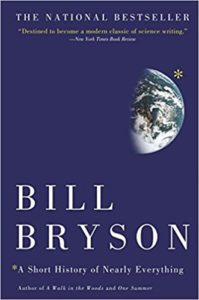
Favorite Quote
“If you were to pick yourself apart with tweezers, one atom at a time, you would produce a mound of fine atomic dust, none of which had ever been alive but all of which had once been you.” — Bill Bryson
The Book in One Sentence
A Short History of Nearly Everything explains everything we’ve learned about our world and the universe so far, including how they formed, how we learned to make sense of time, space, and gravity, why it’s such a miracle that we’re alive, and how much of our planet is still a complete mystery to us.
Why should you read it?
This book will have you laughing out loud one minute and scratching your head in wonderment the next. If you don’t stop to realize that life is an amazing miracle at least once a week, I fully recommend this book to you!
Key Takeaways
- Most of the universe was created in a single, three-minute moment.
- Given the odds of a planet being livable, it’s a miracle we’re here at all.
- Every day that the world keeps turning is a gift, because there are many things that could potentially end it.
If you want to learn more, you can read our free four-minute summary or get a copy for yourself.
_____
23. A Brief History of Time by Stephen Hawking
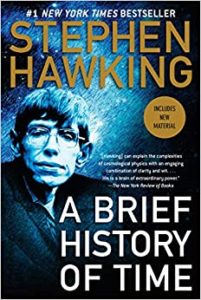
Favorite Quote
“Intelligence is the ability to adapt to change.” — Stephen Hawking
The Book in One Sentence
A Brief History of Time is Stephen Hawking’s simple way of explaining the most complex concepts and ideas of physics, such as space, time, black holes, planets, stars, and gravity, so that you and I can better understand where our planet came from, and where it’s going.
Why should you read it?
Stephen Hawking had one of the fastest-traveling minds of anyone who’s ever lived, and yet, he always managed to convey his incredibly complex insights in the simplest of words. Any minute spent reading a page of one of his books is a minute well spent.
Key Takeaways
- Theories can never be proven.
- Time is not fixed, due to the speed of light.
- There are three reasons why time can likely only move forward.
If you want to learn more, you can read our free four-minute summary or get a copy for yourself.
_____
Best History Books About the Evolution of Humans
24. The Double Helix by James D. Watson
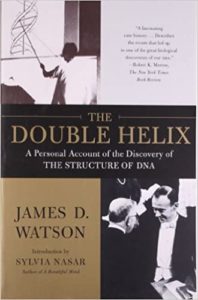
Favorite Quote
“One could not be a successful scientist without realizing that, in contrast to the popular conception supported by newspapers and mothers of scientists, a goodly number of scientists are not only narrow-minded and dull, but also just stupid.” — James D. Watson
The Book in One Sentence
The Double Helix tells the story of the discovery of the structure of DNA, one of the most significant scientific findings in all of history, by outlining the struggles and rivalries of the prideful scientific community, as well as other roadblocks James Watson faced en route to the breakthrough of a lifetime.
Why should you read it?
If you’re obsessed with something, be it art, business, or a mysterious natural phenomenon, this book is for you. That’s what James Watson and Francis Crick shared: an obsession with DNA. In this fascinating account of the discovery and analysis of the basic Lego block of life, you’ll be reassured that your passion can take you very far — if only you stick with it!
Key Takeaways
- Our recent advancements in our understanding of DNA began with a team of chemists in the 1950s.
- Things got tough as they competed with others who were also studying DNA.
- Through perseverance and errors of their competition, Watson and Crick made breakthroughs in the study of genetics that won them a Nobel Prize.
If you want to learn more, you can read our free four-minute summary or get a copy for yourself.
_____
25. The Selfish Gene by Richard Dawkins
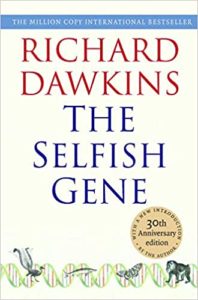
Favorite Quote
“Let us understand what our own selfish genes are up to, because we may then at least have the chance to upset their designs, something that no other species has ever aspired to do.” — Richard Dawkins
The Book in One Sentence
The Selfish Gene explains the process of evolution from the perspective of genes, showing how they manifest in the form of organisms, what they do to ensure their own survival, how they program our brains, which of their strategies have worked best throughout history, and what makes humans so special in this context.
Why should you read it?
If you’ve ever wondered about whether we have free will, this book is for you. Beyond catching you up on everything important you missed while snoozing in biology class, it asserts a shocking theory: What if humans are just the “carriers” of genes, and it’s really the genes running the show? A trippy and yet extremely insight-dense book!
Key Takeaways
- Sometimes, mutually altruistic behaviors benefit the genes of two different organisms.
- Humans have managed to splice off culture with its own evolutionary process.
- Our ability to simulate and foresee allows us to overcome the downside of our selfish genes.
If you want to learn more, you can read our free four-minute summary or get a copy for yourself.
_____
26. Sex at Dawn by Christopher Ryan
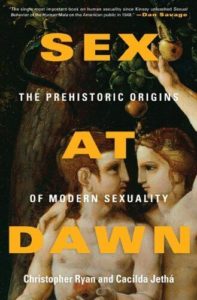
Favorite Quote
“The bigger the society is, the less functional shame becomes.” — Christopher Ryan
The Book in One Sentence
Sex at Dawn challenges all conventional views on sex at once by diving deep into our ancestor’s sexual history and the rise of monogamy, as well as delivering starting points for thinking over our understanding of what sex and relationships should really be like.
Why should you read it?
If you’re shy about sex or know that, deep down, you’re too uptight about it, this book will help. You’ll learn to not stress about sex so much, see it for the biological impulse that it is, and understand that it’s merely a remnant of our distant past, not to be worried about but to be enjoyed.
Key Takeaways
- Agriculture marked the beginning of monogamy, and not in a good way.
- Women want sex just as much as men but are conditioned to play it down.
- Our bodies have evolved to thrive in sexual competition.
If you want to learn more, you can read our free four-minute summary or get a copy for yourself.
_____
Best History Books About Economics
27. A Splendid Exchange by William J. Bernstein
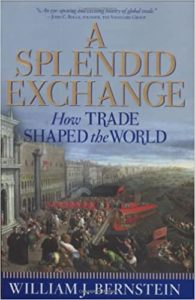
Favorite Quote
“Few other historical inquiries tell us as much about the world we live in today as does the search for the origins of world trade.” — William J. Bernstein
The Book in One Sentence
A Splendid Exchange outlines the history of global trade, revealing how it has enabled the progress of civilization, and how it continues to change the world on a daily basis.
Why should you read it?
All day long, you’re trading. You’re trading your time for money, your money for goods and services, and goods and services for quality moments with your family. Getting better at transacting is something we can all benefit from, and so whether you want to improve your business, become a better investor, or spend money more meaningfully, this book lives up to its title: your time will be well spent in acquiring its knowledge.
Key Takeaways
- One of the earliest trades in history dealt with stones.
- You never just trade the items you exchange.
- Not all innovations that helped foster global trade were about transporting goods.
If you want to learn more, you can read our free four-minute summary or get a copy for yourself.
_____
28. Capitalism by James Fulcher
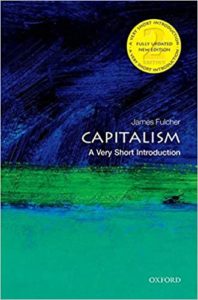
Favorite Quote
“Leisure as a distinct non-work time, whether in the form of the holiday, or evening, was a result of the disciplined and bounded work time created by capitalist production.” — James Fulcher
The Book in One Sentence
Capitalism outlines the origins and future of the world’s most popular and, arguably, successful economic system to show you how money actually makes the world go ’round.
Why should you read it?
The first step to making more money is to understand the way it works, and this book is a great place to start. That said, if you want to know how money can corrupt and how it impacts countries at scale, this is also a good read.
Key Takeaways
- Using money to make more of it is the core of capitalism.
- Although it’s hard to pinpoint the exact birth of this system, the roots of it began in medieval Europe.
- One feature of capitalism is financial crises, and we need to fix this.
If you want to learn more, you can read our free four-minute summary or get a copy for yourself.
_____
29. Narrative Economics by Robert J. Shiller
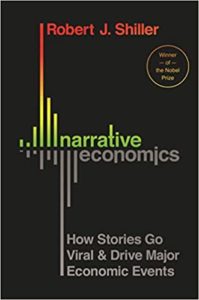
Favorite Quote
“Trying to understand major economic events by looking only at data on changes in economic aggregates runs the risk of missing the underlying motivations for change. Doing so is like trying to understand a religious awakening by looking at the cost of printing religious tracts.” — Robert J. Shiller
The Book in One Sentence
Narrative Economics explains why stories have a massive influence on the way our economies operate, analyzing in particular the rise of Bitcoin, several stock market booms and busts, and the nature of epidemics.
Why should you read it?
If you’re a stay-in-the-loop kind of person, this book is for you. It’s also for you if you’re an investor or entrepreneur, as narratives dramatically shape our economic landscape all the time. To anyone who wants to learn why certain topics dominate our conversations where others don’t: read this book.
Key Takeaways
- Bitcoin is the perfect example of how stories affect economics.
- Epidemics and economic narratives have a lot in common.
- If we want to be ready for the future, we need to understand the narratives of the past.
If you want to learn more, you can read our free four-minute summary or get a copy for yourself.
_____
Best History Books About Global Politics
30. A World in Disarray by Richard Haass
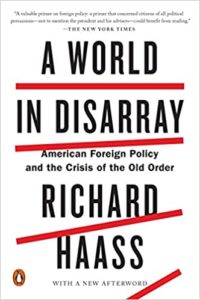
Favorite Quote
“Managing a situation in a manner that fails to address core issues can be preferable to attempting to bring about a solution sure to be unacceptable to one or more of the parties.” — Richard Haass
The Book in One Sentence
A World in Disarray will open your mind to new ways of making the world a more peaceful place by guiding you through the major changes in global affairs since World War II.
Why should you read it?
If you’re a pacifist, chances are, this title is for you. If you want to know what it takes to keep world peace and where we’re about to fail to do so, read this book.
Key Takeaways
- Things have been relatively peaceful since World War II because of power balances, nuclear weapons, and economic agreements.
- New policies concerning intervention in international events were born when the world stood by during the tragedies in Rwanda.
- The three major superpowers must thrive and cooperate if we want to have a peaceful world.
If you want to learn more, you can read our free four-minute summary or get a copy for yourself.
_____
31. Prisoners of Geography by Tim Marshall
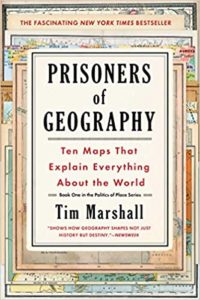
Favorite Quote
“Why do you think your values would work in a culture you don’t understand?” — Tim Marshall
The Book in One Sentence
Prisoners of Geography explains how the location of a country dramatically affects its success and the amount of power it has in the world, as well as why and how geography has determined the outcomes of major world events for centuries.
Why should you read it?
This book will show you why the world is the way it is. Why is America so powerful and Africa so poor? Why is Russia always worried about war? A fascinating theory with really sound arguments.
Key Takeaways
- Russia could get invaded from the West; that’s why they have a strong presence in the Baltics.
- The United States is nearly invulnerable because of where it’s located.
- Southern Europe suffers while its northern countries flourish, simply because of geography.
If you want to learn more, you can read our free four-minute summary or get a copy for yourself.
_____
Best History Books About Civilization and Society
32. The Power of Myth by Joseph Campbell
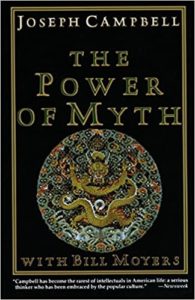
Favorite Quote
“We’re so engaged in doing things to achieve purposes of outer value that we forget the inner value, the rapture that is associated with being alive, is what it is all about.” — Joseph Campbell
The Book in One Sentence
The Power of Myth is a book based on Joseph Campbell and Bill Moyer’s popular 1988 documentary of the same name, explaining where myths come from, why they are so common in society, how they’ve evolved, and what important role they still play in our ever-changing world today.
Why should you read it?
If you wonder why we’re here or what happens after death, read this book. It’ll show you that myths are useful beyond being good stories, and it’ll also teach you how to tell better stories yourself.
Key Takeaways
- Myths are stories that unite people in communities, identify the beginnings of cultures and giving people a common identity.
- As guidelines for community members, legends give a framework for people to think and act.
- The power of myth helps us make sense of life, appreciate it, and even prepare to die.
If you want to learn more, you can read our free four-minute summary or get a copy for yourself.
_____
33. The Republic by Plato
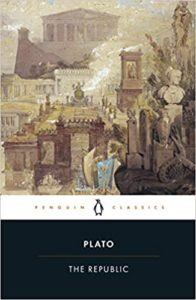
Favorite Quote
“The heaviest penalty for declining to rule is to be ruled by someone inferior to yourself.” — Plato
The Book in One Sentence
The Republic is one of the most important works about philosophy and politics in history, written by Plato, one of Socrates’ students in ancient Greece, as a dialogue about justice and political systems between Socrates and various Athenian citizens.
Why should you read it?
If you feel like your country’s judicial system isn’t working, this book is for you. It’ll also show you why it’s difficult to rule others, no matter what form that takes. Even a middle manager could benefit from reading this book. It’s hard to go wrong with such a classic.
Key Takeaways
- Justice must be looked at on an individual as well as a city level.
- Both cities and souls can be divided into three distinct parts.
- Philosophers trying to rule others justly will face lots of difficulty.
If you want to learn more, you can read our free four-minute summary or get a copy for yourself.
_____
34. Caste by Isabel Wilkerson
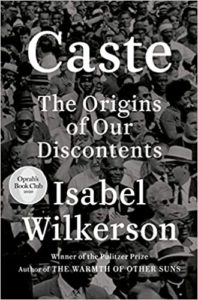
Favorite Quote
“The price of privilege is the moral duty to act when no one sees another person treated unfairly. And the least that a person in the dominant caste can do is not make the pain any worse.” — Isabel Wilkerson
The Book in One Sentence
Caste unveils the hidden cultural and societal rules of our class system, including where it comes from, why it’s so deeply entrenched in society, and how we can dismantle it forever to finally allow all people to have the equality they deserve.
Why should you read it?
Whether you believe you are suffering from the social class system, want to know more about it, or hope to understand what alternative structures society could use to function better, this is the book for you.
Key Takeaways
- There are eight foundational pillars of a caste system, and the first four are Divine Will and Laws of Nature, Heritability, Endogamy, and Purity vs Pollution.
- The last four pillars of the caste system deal with hierarchy, dehumanization, terror, and superiority.
- We can dismantle the caste with monuments and memorials and support all who try to break it down.
If you want to learn more, you can read our free four-minute summary or get a copy for yourself.
_____
Best History Books About Nation States and Political Systems
35. The Social Contract by Jean-Jaques Rousseau
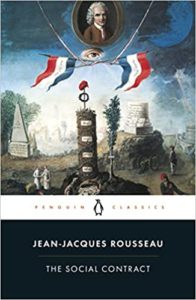
Favorite Quote
“Man is born free, and everywhere he is in chains.” — Jean-Jacques Rousseau
The Book in One Sentence
The Social Contract is a political piece of writing that serves as a roadmap for the democracies of today, outlining the elements of a free state in which people agree to coexist with each other under the rules of a common body that represents the general will.
Why should you read it?
Most of us aspire to be sovereign citizens in a free state, but we have no idea what that even means. This all-time classic of philosophy will show you.
Key Takeaways
- A state becomes legitimate only if its citizens accept to live in it.
- The general will of the people should be the law of any legitimate state.
- People should meet often to express their will and communicate more for better governance.
If you want to learn more, you can read our free four-minute summary or get a copy for yourself.
_____
36. Capitalism and Freedom by Milton Friedman
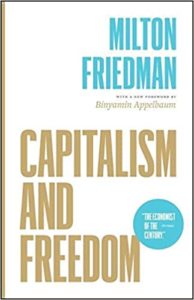
Favorite Quote
“To the free man, the country is the collection of individuals who compose it, not something over and above them.” — Milton Friedman
The Book in One Sentence
Capitalism and Freedom helps you understand some of the most important factors protecting your liberty by outlining the government’s role in economics and explaining how things go best when political entities are small and stay out of the flow of money in a country.
Why should you read it?
For better or for worse, capitalism is impossible to ignore or do away with in our current civilization. If you want to better understand free markets and the benefits and advantages of fully enabling those vs. going with more regulated, government-steered systems, this book is for you.
Key Takeaways
- Freedom, both political and economic, is healthier when government is small and decentralized.
- When the feds mess with the economy, things get worse even though politicians are trying to make them better.
- A negative income tax, among other measures, should replace the current inefficient social welfare systems.
If you want to learn more, you can read our free four-minute summary or get a copy for yourself.
_____
37. The Road to Serfdom by Friedrich Hayek
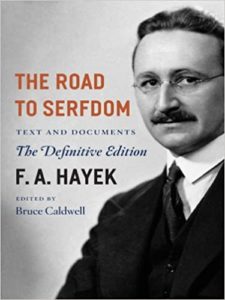
Favorite Quote
“To act on behalf of a group seems to free people of many of the moral restraints which control their behavior as individuals within the group.” — Friedrich Hayek
The Book in One Sentence
The Road to Serfdom makes a case for keeping our freedom and individuality by rejecting socialism, identifying its risks to turn into totalitarianism, and highlighting the socialist dynamics taking a hold in global politics after WWII.
Why should you read it?
This book will show you how much control a government should have — and what happens when it oversteps its boundaries. If you’re worried about various governments’ increasing interventions in our day-to-day lives, read this one.
Key Takeaways
- Socialism doesn’t enable personal freedom, it smothers it.
- Corrupt people end up in power in totalitarian, socialist systems.
- The socialist parts of the world struggled after World War II, but the freer countries thrived because of their freedom.
If you want to learn more, you can read our free four-minute summary or get a copy for yourself.
_____
38. Socialism by Michael W. Newman
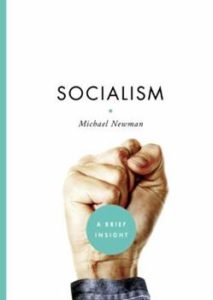
Favorite Quote
“Today’s utopia often becomes tomorrow’s reality.” — Michael W. Newman
The Book in One Sentence
Socialism outlines the history of the governmental theory that everything should be owned and controlled by the community as a whole, including how this idea has impacted the world in the last 200 years, how its original aims have been lost, and in what ways we might use it in the future.
Why should you read it?
If you feel like socialism might be the answer to all our problems, read this book. It’ll show you that it started from good intentions but later spiraled off the virtuous path — but also what we might be able to learn form and do with this system in the future.
Key Takeaways
- There might not be a single, simple definition of socialism, but the different forms it’s had over the years share common characteristics.
- Nineteenth-century capitalism paved the way for socialism, and from there, it divided into two different schools of thought.
- If we learn from the mistakes of the past, socialism can actually bring a promising future.
If you want to learn more, you can read our free four-minute summary or get a copy for yourself.
_____
39. Fascism by Madeleine K. Albright
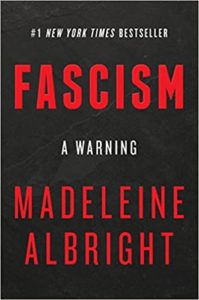
Favorite Quote
“The real question is: who has the responsibility to uphold human rights? The answer to that is: everyone.” — Madeleine Albright
The Book in One Sentence
Fascism explores what lies behind its titular, far-right, authoritarian ideology, from how it can rise to power in uncertain times to why it still poses a serious threat against even our most established democratic systems today.
Why should you read it?
If you think a few skinheads here and there probably won’t be a big problem, read this book. It’s a fascinating account of how quickly extremism can spiral out of control if left unchecked, and what are the right ways to keep it in check without trying to choke it altogether and thus be as bad as outright fascists themselves.
Key Takeaways
- Authoritarian parties often rise to power through democratic means.
- We can always expect fascism to find its way back, history says.
- Democracy is fragile, and we should defend it.
If you want to learn more, you can read our free four-minute summary or get a copy for yourself.
_____
40. On Liberty by John Stuart Mill
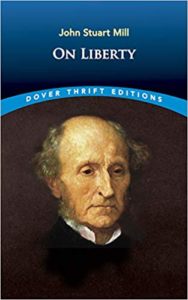
Favorite Quote
“One person with a belief is equal to a force of ninety-nine who have only interests.” — John Stuart Mill
The Book in One Sentence
On Liberty is a philosophy classic that laid the foundation of modern liberal politics, applying the concept of utilitarianism to societies and countries in order to create a working system between authority and liberty.
Why should you read it?
This is a classic but not easy to read, yet if you truly want to understand democracy and freedom, and why one doesn’t automatically lead to the other, this may be worth a few hours of concentrated studying.
Key Takeaways
- Democracy alone does not guarantee personal freedom.
- The only reason to limit liberty should be to save people from harm.
- False opinions are not only good, they’re important.
If you want to learn more, you can read our free four-minute summary or get a copy for yourself.
_____
41. How Democracies Die by Steven Levitsky
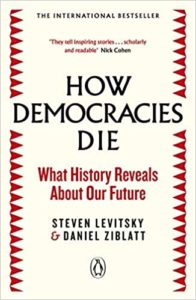
Favorite Quote
“Democracies may die at the hands not of generals but of elected leaders — presidents or prime ministers who subvert the very process that brought them to power. Some of these leaders dismantle democracy quickly, as Hitler did. More often, though, democracies erode slowly, in barely visible steps.” — Steven Levitsky
The Book in One Sentence
How Democracies Die lays out the foundational principles of working democracies by looking at historical events, especially in Latin America, that show how democracies have failed in the past, how it could happen again, and how we can protect democracy from threats like bad leadership, inequality, and extremism.
Why should you read it?
If you live in a democratic country, you probably take your political process and inclusion for granted. This book shows that it can all end rather quickly, and before we know it, we won’t have a say at all. To learn more about the pitfalls of democracy and how we can avoid them, read this book.
Key Takeaways
- A democracy needs solid gatekeepers to protect it.
- With the arrival of Donald Trump in the political arena, the future of our democracy depends on our leadership.
- We can resist authoritarianism by holding fast to democratic norms.
If you want to learn more, you can read our free four-minute summary or get a copy for yourself.
_____
Best History Books About Ethics
42. Discourses by Epictetus
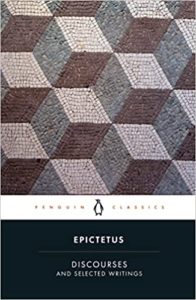
Favorite Quote
“What else is freedom but the power to live our life the way we want?” — Epictetus
The Book in One Sentence
Discourses is a transcription of the lectures of ancient philosopher Epictetus, resulting in a series of lessons and tales that help us make sense of what’s happening around and to us, including hardship, challenges, and life events that will ultimately make our character stronger.
Why should you read it?
This book will make you more resilient in the face of failure, rejection, and adversity. Written as mostly easily digestible, informal lectures Epictetus gave to his students, you’ll find plenty of little bits of inspiration in this classic.
Key Takeaways
- Without life’s challenges, we wouldn’t feel the need to grow and evolve.
- Everything that is great in life takes time and effort to build.
- If you can’t control it, don’t stress over it.
If you want to learn more, you can read our free four-minute summary or get a copy for yourself.
_____
43. The Lucifer Effect by Philip Zimbardo
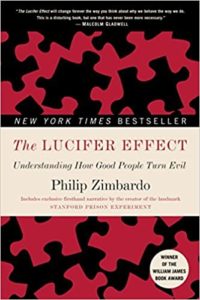
Favorite Quote
“The line between good and evil is permeable and almost anyone can be induced to cross it when pressured by situational forces.” — Philip Zimbardo
The Book in One Sentence
The Lucifer Effect explains why you’re not always a good person, identifying the often misunderstood line between good and evil that we all walk by recounting the shocking results of the author’s Stanford Prison Experiment that show anyone can be made to do evil under the right (or wrong) circumstances.
Why should you read it?
Dividing the world into “good people” and “bad people” is easy. Realizing anyone has great capacity for both is hard — but it’s the truth we need, and that’s what this book is for. Shocking and much needed, this book is a must-read for anyone who wants to be a good person or who’s curious as to why even some of the best people in the world turn evil.
Key Takeaways
- Your personality changes depending on the situation you’re in.
- The Stanford prison experiment is a shocking example of just how bad everyday people can get in the right, or wrong, circumstances.
- Don’t worry about being permanently evil; you can always choose to be a hero and act morally.
If you want to learn more, you can read our free four-minute summary or get a copy for yourself.
_____
44. The Better Angels of Our Nature by Steven Pinker
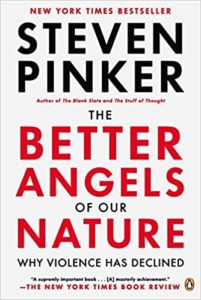
Favorite Quote
“As one becomes aware of the decline of violence, the world begins to look different. The past seems less innocent; the present less sinister.” — Steven Pinker
The Book in One Sentence
The Better Angels of Our Nature argues that we live in the most peaceful time in history by looking at what motivates us to behave violently, how these motivators are outweighed by our tendencies towards a peaceful life, and which major shifts in history caused this global reduction in crime and violence.
Why should you read it?
If you need a break from bad news and doombait, this is the one to grab. Well-researched and uplifting, it’ll show you that the world is better than it seems — and there’s always more we can do to make it even better!
Key Takeaways
- Ideologies always start out with good intentions but can quickly deteriorate into horrific proponents of violence.
- The Flynn effect increases our ability to reason over time, which makes us less violent.
- With the invention of the printing press, humanitarian philosophy could spread and further decrease violence across the board.
If you want to learn more, you can read our free four-minute summary or get a copy for yourself.
_____
Best History Books About the Evolution of Philosophy
45. Meditations on First Philosophy by René Descartes
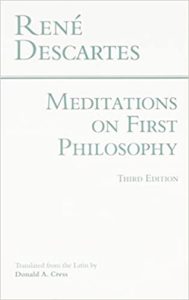
Favorite Quote
“Dubium sapientiae initium — doubt is the origin of wisdom.” — René Descartes
The Book in One Sentence
Meditations on First Philosophy is the number one work of philosophy of the Western world, written by René Descartes in 1641, abandoning everything that can be doubted and then starting to reason his way from there.
Why should you read it?
If you often find yourself stricken with doubt and wish it weren’t so, this book is for you. It reveals the upside of doubt and how it can help us challenge our own assumptions and improve. This book will teach you to apply your knowledge in a scientific manner rather than just take things at face value.
Key Takeaways
- Your senses don’t always tell the truth.
- The fact that you think proves that you exist.
- There are three levels of truth in the world.
If you want to learn more, you can read our free four-minute summary or get a copy for yourself.
_____
46. The Story of Philosophy by Will Durant
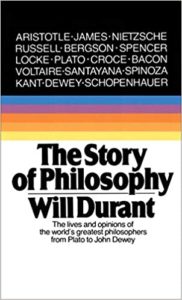
Favorite Quote
“Civilization begins with order, grows with liberty, and dies with chaos.” — Will Durant
The Book in One Sentence
The Story of Philosophy profiles the lives of great Western philosophers such as Plato, Socrates, and Nietzsche, exploring their contemplations on governance, religion, the meaning of life, and other philosophic concepts from their individual lifetimes of research, thought, and diligent study.
Why should you read it?
If you want a comprehensive but quick overview of history’s most important philosophers and how their ideas shaped the world, read this book.
Key Takeaways
- Ancient Greek philosophers paved the way for philosophy, science, and a new form of governance.
- Philosopher Spinoza helped decipher the hidden meanings in religion.
- Voltaire was partially responsible for the French revolution and the improvement of political systems around the world.
If you want to learn more, you can read our free four-minute summary or get a copy for yourself.
_____
47. Lives of the Stoics by Ryan Holiday
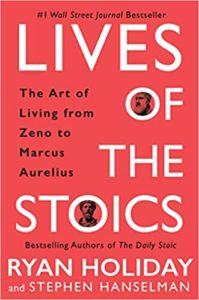
Favorite Quote
“There is no better definition of a Stoic: to have but not want, to enjoy without needing.” — Ryan Holiday
The Book in One Sentence
Lives of the Stoics is a deep dive into the experiences and beliefs of some of the earliest philosophers and followers of stoic virtues like justice, courage, and temperance.
Why should you read it?
This book covers both the tenets of Stoic philosophy itself as well as its most prominent proponents. The chapters are short and written in an easy-to-digest style, so for anyone looking to improve their lives, this is a good pick!
Key Takeaways
- Stoicism came about as a result of extreme hardship.
- Not everyone who followed Stoicism lived up to its standards.
- Marcus Aurelius was a Roman whose practice of Stoicism helped him lead with compassion and humility.
If you want to learn more, you can read our free four-minute summary or get a copy for yourself.
_____
Best History Books About Climate Change & Population Growth
48. The Sixth Extinction by Elizabeth Kolbert
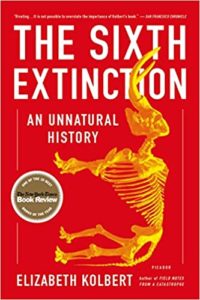
Favorite Quote
“As soon as humans started using signs and symbols to represent the natural world, they pushed beyond the limits of that world.” — Elizabeth Kolbert
The Book in One Sentence
The Sixth Extinction summarizes how human activity has contributed to the mass extinction of species and points out ways to mitigate our biggest environmental problems.
Why should you read it?
Instead of just doling out more blame to humans for destroying the planet, this book focuses on facts, which makes it refreshing. If you want a book about the environment that makes you feel less guilty and more empowered to act, go for this one.
Key Takeaways
- There are several ways in which the human race is responsible for the sixth mass extinction.
- Homo sapiens has been encouraging the extinction of various species long before the industrial era.
- There are many ideas for what we can still do to save at least some species.
If you want to learn more, you can read our free four-minute summary or get a copy for yourself.
_____
49. The Uninhabitable Earth by David Wallace-Wells
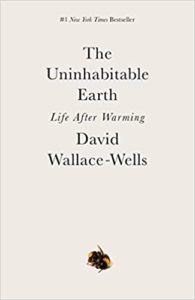
Favorite Quote
“We think of climate change as slow, but it is unnervingly fast. We think of the technological change necessary to avert it as fast-arriving, but it is deceptively slow judged by how soon we need it.” — David Wallace-Wells
The Book in One Sentence
The Uninhabitable Earth explains how humanity’s complacency and negligence have put this world on a course to soon be unlivable unless we each do our small part to improve how we care for this beautiful planet we live on.
Why should you read it?
While I would recommend balancing this book with something a little less depressing, it provides a fantastic overview of all the factors contributing to global warming. So if you want to know where we can start digging in to save the planet and our future, this one’s for you!
Key Takeaways
- Even enacting all the policy changes agreed to in Paris, we will still exceed the threshold where climate disaster begins.
- Without emissions reduction, we will see our oceans rise to fatal levels, putting major cities underwater.
- Unless we change our ways, bacteria of ancient diseases in melting Arctic ice sheets will begin a global health crisis.
If you want to learn more, you can read our free four-minute summary or get a copy for yourself.
_____
50. Empty Planet by Darrell Bricker & John Ibbitson
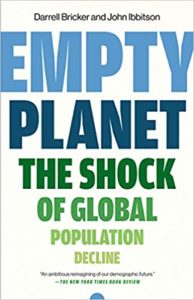
Favorite Quote
“Will we struggle to preserve growth, or accept with grace a world in which people both thrive and strive less?” ― Darrell Bricker & John Ibbitson
The Book in One Sentence
Empty Planet explains why overpopulation alarmists are wrong, and how depopulation poses the more imminent threat to the happiness and success of humanity.
Why should you read it?
Whether you want to have kids or not, this book will change your perspective on the common notion that “there are already too many people on the planet,” showing that we might soon suffer from the opposite of this problem. An enlightening and contrarian read!
Key Takeaways
- The forces that cause fertility to drop, such as urbanization, education, and secularization, only increase.
- A falling population threatens human quality life in a variety of ways, both materially and culturally.
- Population decline is likely to happen even more quickly than predictions suggest.
If you want to learn more, you can read our free four-minute summary or get a copy for yourself.
_____
Best History Books With a Self-Help Angle
51. The Prince by Niccolò Machiavelli
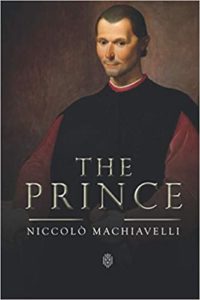
Favorite Quote
“Everyone sees what you appear to be, few experience what you really are.” — Niccolò Machiavelli
The Book in One Sentence
The Prince is a 16th century political treatise, famous for condoning, even encouraging evil behavior amongst political rulers in order for them to stay in power.
Why should you read it?
If you secretly lust for power, this book is for you. It’ll show you how to get and keep that power, sure, but also how to use it well and how to avoid becoming a “Machiavellian prince” who gets completely consumed by their own desire for more.
Key Takeaways
- Countries can be easy to conquer but hard to rule or vice versa – and markets are the same.
- To protect a country it needs its own army, not mercenaries. The same holds true for businesses.
- If you want to run a business, you have to assemble your advisors and know when to listen to them.
If you want to learn more, you can read our free four-minute summary or get a copy for yourself.
_____
52. Man’s Search for Meaning by Viktor Frankl
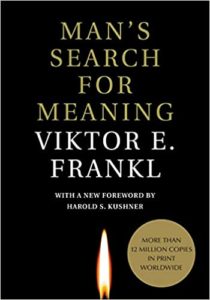
Favorite Quote
“Everything can be taken from a man but one thing: the last of the human freedoms — to choose one’s attitude in any given set of circumstances, to choose one’s own way.” — Viktor Frankl
The Book in One Sentence
Man’s Search for Meaning details holocaust survivor Viktor Frankl’s horrifying experiences in Nazi concentration camps, along with his psychological approach of logotherapy, which is also what helped him survive and shows you how you can – and must – find meaning in your life.
Why should you read it?
If you’ve ever felt hopelessness and despair, this book is for you. It’ll show you that there’s a way out of any situation, no matter how grim — even if that way is just accepting the situation as it is and waiting for it to pass. A must-read for almost anyone.
Key Takeaways
- Sometimes the only way to survive is to surrender to death.
- Your life has its own meaning, and it’s up to you to find it.
- Use paradoxical intention to make your fears go away.
If you want to learn more, you can read our free four-minute summary or get a copy for yourself.
_____
53. The 48 Laws of Power by Robert Greene
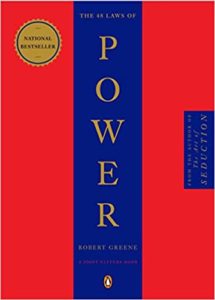
Favorite Quote
“Powerful people impress and intimidate by saying less. The more you say, the more likely you are to say something foolish.” — Robert Greene
The Book in One Sentence
The 48 Laws of Power draws on many of history’s most famous power quarrels to show you what power looks like, how you can get it, what to do to defend yourself against the power of others, and, most importantly, how to keep it and use it well.
Why should you read it?
This book will show you how to get ahead in life thanks to some uncomfortable but important truths. Each law comes with a short story about an interesting person, so it’s a nice pastime book as well.
Key Takeaways
- Always make superiors look smarter than you.
- Confuse competitors by acting unpredictably.
- Don’t force others to do what you want, seduce them instead.
If you want to learn more, you can read our free four-minute summary or get a copy for yourself.
_____
Best History Books About Important People
54. Alexander the Great by Philip Freeman
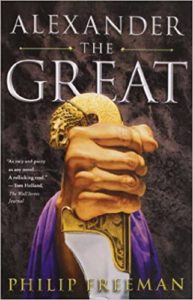
Favorite Quote
“There is nothing impossible to him who will try.” — Alexander the Great
The Book in One Sentence
Alexander the Great is the definitive biography of the life of the ancient Macedonian king, who would extend his empire from a little slide of land in Greece through Persia, Egypt, and all the way to India, forming the greatest empire the ancient world had ever seen.
Why should you read it?
Whether you’re looking to fill a gap in your knowledge or just want an absolutely epic story, this book will deliver both. It’ll reveal the origins of Christianity as well as detail one young man’s dramatic conquest of the world, and you’ll feel both entertained and informed.
Key Takeaways
- Bundle your energy.
- Always do the unexpected.
- Without Alexander the Great, Christianity wouldn’t exist.
If you want to learn more, you can read our free four-minute summary or get a copy for yourself.
_____
55. Benjamin Franklin: An American Life by Walter Isaacson
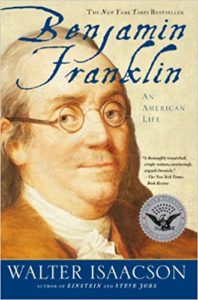
Favorite Quote
“Knowledge is obtained rather by the use of the ear than of the tongue.” — Benjamin Franklin
The Book in One Sentence
Benjamin Franklin: An American Life takes a thorough look at the life of one of the most influential humans who ever lived and explains how he could achieve such greatness in so many different fields and areas.
Why should you read it?
Walter Isaacson might be the best biographer alive today, and any book of his feels more like a novel than a boring list of accomplishments. Whether you want to be creative, succeed in business, or learn more about the history of the US and its important people, this book is a great place to start!
Key Takeaways
- Benjamin Franklin was a self-improvement nerd.
- If you really want to learn something, you’ll find a way.
- Don’t be afraid to be 20 years ahead of your time.
If you want to learn more, you can read our free four-minute summary or get a copy for yourself.
_____
56. The Autobiography of Malcolm X by Malcolm X
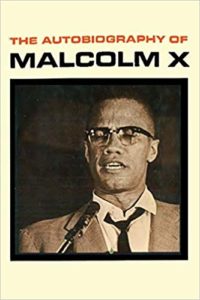
Favorite Quote
“The ability to read awoke inside of me some long dormant craving to be mentally alive.” — Malcolm X
The Book in One Sentence
The Autobiography of Malcolm X chronicles the life and work of one of the most influential members of the civil rights movement in the United States, Malcolm Little, aka Malcolm X.
Why should you read it?
If you want to get a real sense of how difficult it was for the civil rights movement to succeed, and what it truly takes to bring about change in the world, you’ll love this book.
Key Takeaways
- What happens in your childhood will leave a mark on you for life.
- Sometimes, you have to get totally lost to find yourself.
- Even the best of us can get it wrong.
If you want to learn more, you can read our free four-minute summary or get a copy for yourself.
_____
57. Steve Jobs by Walter Isaacson
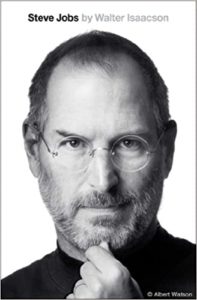
Favorite Quote
“The people who are crazy enough to think they can change the world are the ones who do.” — Steve Jobs
The Book in One Sentence
Steve Jobs is the most detailed and accurate account of the life of the man who created Apple, the most valuable technology company in the world.
Why should you read it?
Do you want to build a business? Create great technology? Change the world? Look no further. Jobs’ story has it all, and, given how recently it all happened, this is one of the most relevant biographies to read in the 21st century.
Key Takeaways
- Steve Jobs’s team invented a name for his most important skill, the reality distortion field.
- The Apple name was chosen for a very specific reason.
- Apple didn’t make Steve Jobs a billionaire, Pixar did.
If you want to learn more, you can read our free four-minute summary or get a copy for yourself.
_____
58. The Immortal Life of Henrietta Lacks by Rebecca Skloot
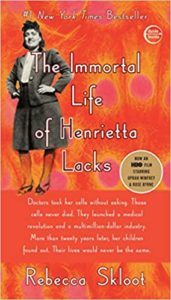
Favorite Quote
“Henrietta’s were different: They became the first immortal human cells ever grown in a laboratory.” — Rebecca Skloot
The Book in One Sentence
The Immortal Life of Henrietta Lacks reveals the previously unknown story of a woman with extraordinary cells that still live today, and how they have contributed to dozens of medical breakthroughs.
Why should you read it?
If you want to better understand how consent works in healthcare while discovering the inspiring story of a forgotten but extremely impactful individual, this is the one to grab off the shelf.
Key Takeaways
- Henrietta Lacks was a poor Black woman who died of aggressive cervical cancer at a young age, but her immortal cells lived on.
- Even though her cells were famous, most people didn’t know of Henrietta and her family until recently.
- The use of Hela cells has raised questions about privacy and ethics in cell donation.
If you want to learn more, you can read our free four-minute summary or get a copy for yourself.
_____
59. A Woman of No Importance by Sonia Purnell
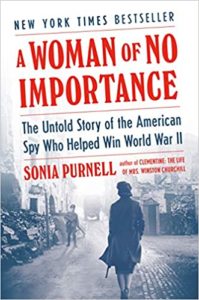
Favorite Quote
“Valor rarely reaps the dividends it should.” — Sonia Purnell
The Book in One Sentence
A Woman of No Importance tells the fascinating story of Virginia Hall, an American who became one of the best spies for the Allies in World War II, thus significantly contributing to the defeat of Nazi Germany.
Why should you read it?
This book will make you feel empowered to choose your own way in life. Hall’s life reads like a movie, and if you hear the call to adventure but are hesitant to follow it, this might be the little push you need to live your best life despite all the difficulties it might bring.
Key Takeaways
- Too independent to marry, Hall went on to study in Europe and pursue a political career even though she lost a leg in a terrible accident.
- After multiple failed attempts to join the war efforts, she finally became a member of the Special Operations Executive, or SOE, almost by accident.
- Virginia’s work helped in many different ways during World War II, including the vital preparations for D-Day.
If you want to learn more, you can read our free four-minute summary or get a copy for yourself.
_____
60. Long Walk to Freedom by Nelson Mandela
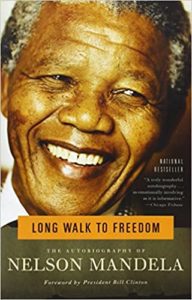
Favorite Quote
“I learned that courage was not the absence of fear, but the triumph over it. The brave man is not he who does not feel afraid, but he who conquers that fear.” — Nelson Mandela
The Book in One Sentence
Long Walk to Freedom is the autobiography of Nelson Mandela, South African anti-apartheid activist, national icon, and the first Black South African president, elected in the first fully democratic election in the country.
Why should you read it?
If you’ve ever wondered how someone might survive more than 20 years in a tiny jail cell without going insane, make this your next read. Mandela’s story is one of the most inspiring ones I’ve ever learned about, and I’m sure his story will make you feel stronger and more courageous too.
Key Takeaways
- Your best bet at finding true freedom is education.
- If you want to be remembered, you must learn to challenge authority.
- It’s most important that you don’t give up right after your biggest setback.
If you want to learn more, you can read our free four-minute summary or get a copy for yourself.
_____
Conclusion
That concludes our list of the best history books. Don’t let its size intimidate you. History is a large field, and you just have to start somewhere that interests you! Pick the first book that jumps out at you, read its free summary on Four Minute Books, and then perhaps order a copy for yourself to dive in deeper later.
There is nothing new under the sun — but if we don’t study past sunrises and sunsets, we won’t see what’s coming, and everything, from pandemics to recessions to political tensions, will shock us into paralysis. When we study history, we are always prepared, even for the unexpected. Understand the past, master the future. That’s how it works — there’s no better day to start than today.
Other Book Lists by Topic
Looking for more of the best books on various topics? Here are all the book lists we’ve made for you so far:
- The 60 Best Business Books of All Time (Will Forever Change How You Think About Organizations)
- The 20 Best Entrepreneurship Books to Start, Grow & Run a Successful Business
- The 14 Best Finance Books of All Time
- The 21 Best Habit Books of All Time to Change Any Behavior
- The 33 Best Happiness Books of All Time That Everyone Should Read
- The 60 Best History Books of All Time (to Read at Any Age)
- The 7 Best Inspirational Books That Will Light Your Inner Fire
- The 40 Best Leadership Books of All Time to Help You Become a Truly Inspiring Person
- The 31 Best Motivational Books Ever Written
- The 12 Best Nonfiction Books Most People Have Never Heard Of
- The 35 Best Philosophy Books to Live Better and Become a Great Thinker
- The 34 Best Psychology Books That Will Make You Smarter and Happier
- The 25 Best Sales Books of All Time to Help You Close Any Deal
- The 33 Best Self-Help Books of All Time to Read at Any Age
- The 22 Best Books About Sex & Sexuality to Improve Your Love Life & Relationships
- The 30 Most Life-Changing Books That Will Shift Your Perspective & Stay With You Forever
Other Book Lists by Author
Looking for more books by the world’s most celebrated authors? Here are all of the book lists by the author we’ve curated for you:
- All Brené Brown Books, Sorted Chronologically (and by Popularity)
- Jordan Peterson Books: All Titles in Order of Publication + The 5 Top Books He Recommends
- All Malcolm Gladwell Books, Sorted Chronologically (and by Popularity)
- All Michael Pollan Books, Sorted Chronologically (and by Popularity)
- Peter Thiel Books: A Comprehensive List of Books By, About & Recommended by Peter Thiel
- All Rachel Hollis Books: The Full List of Non-Fiction, Fiction & Cookbooks, Sorted by Popularity & the Best Reading Order
- All Ray Dalio Books, Sorted Chronologically (and by Popularity)
- All Robert Greene Books, Sorted Chronologically (and by Popularity)
- All Ryan Holiday Books, Sorted Chronologically (and by Popularity)
- All Simon Sinek Books, Sorted Chronologically (and by Popularity)
- All Tim Ferriss Books, Sorted Chronologically (and by Popularity)
- All Walter Isaacson Books, Sorted Chronologically (and by Popularity)
Last Updated on February 20, 2023